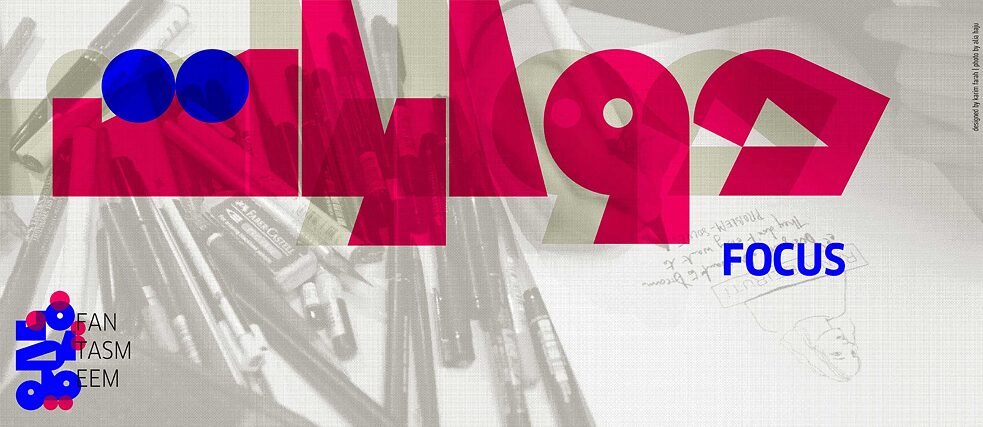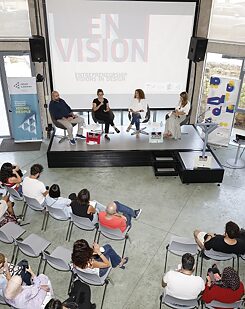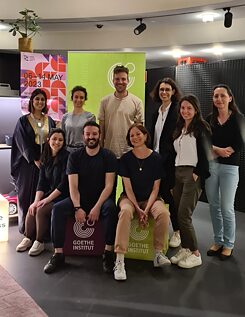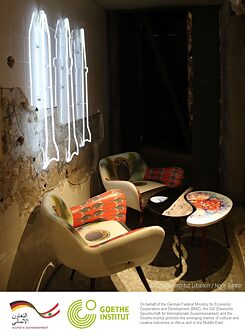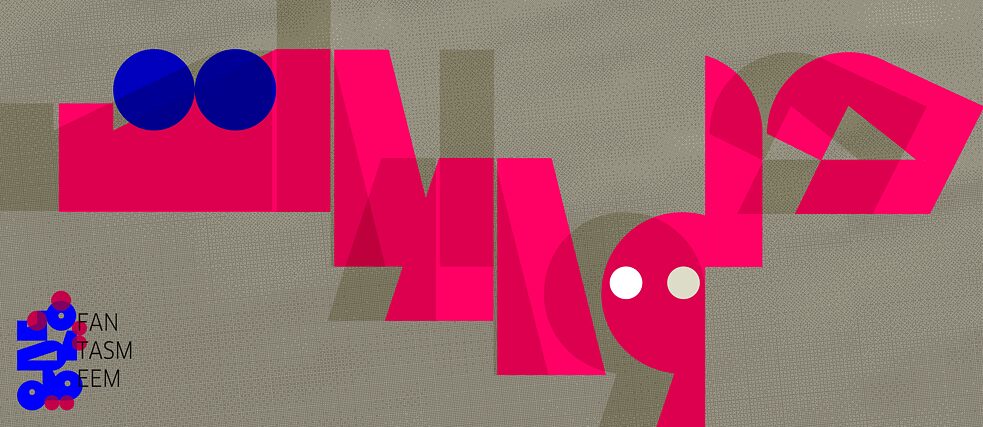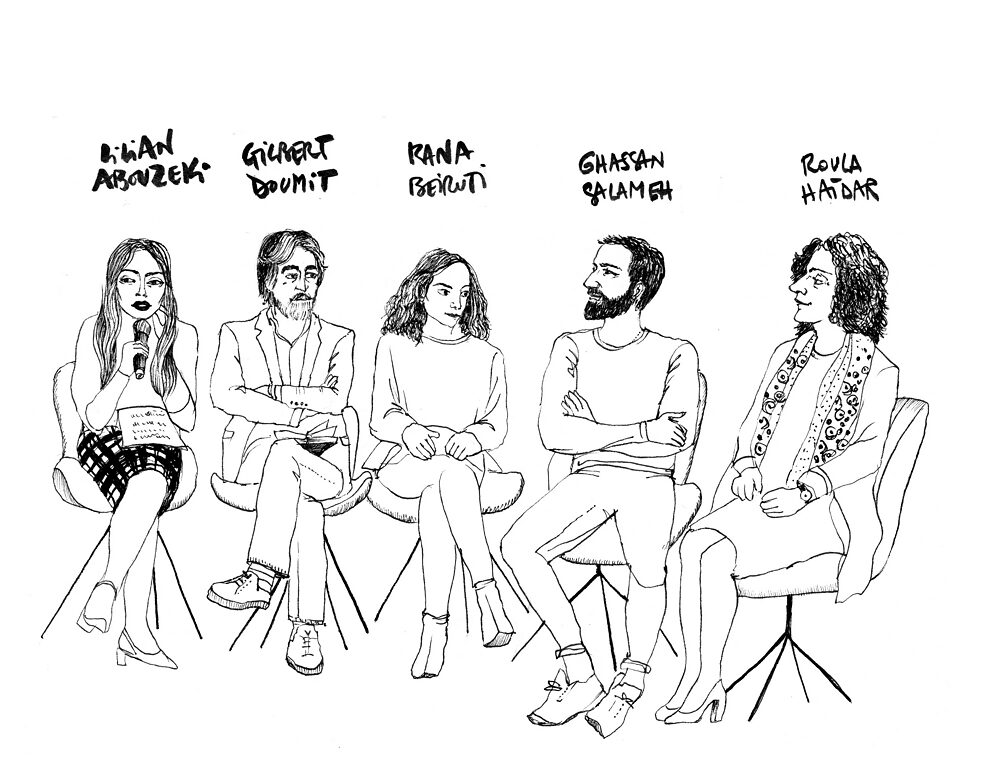EnVision: Design Dialogue Series
Between September and October 2023, a series of Design Dialogue Panel Discussions was launched as part of the training program “EnVsion: Entrepreneurship Visions in Design”, which is a collaborative initiative between Goethe-Institut Libanon (FANTASMEEM) and INJAZ Lebanon. These dialogues featured local, regional, and international design and social innovation experts who shared their experiences and insights on design, innovation, sustainability, social entrepreneurship, technology, and human-centred design. Two of these panels were held online, and were open to public registrations in Lebanon, Jordan, Iraq, and Germany to foster regional and international interactions.
The panels were as follows:
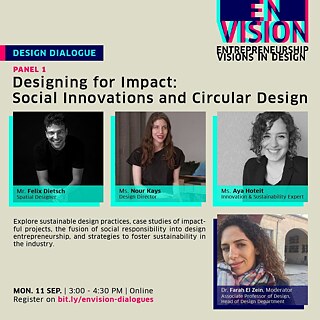
|
1) Designing For Impact: Social Innovations and Circular Design Online | 11/09/2023 Panelists: Felix Dietsch | Spatial Designer & Trainer Nour Kays | Design Director Aya Hoteit | Innovation and Sustainability Expert Moderated by: Farah El Zein | Associate Professor of Design; Head of Design Department, AUCY |
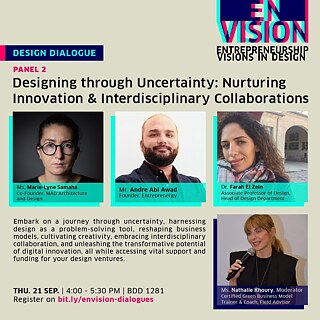
|
2) Designing Through Uncertainty: Nurturing Innovation and Interdisciplinary Collaborations Offline at BDD 1280 | 21/09/2023 Panelists: Marie-lyne Samaha | Co-Founder of Mad Architecture and Design Andre Abi Awad | International Trainer & Business Advisor; Founder of Entreprenergy Farah El Zein | Associate Professor of Design; Head of Design Department, AUCY Moderated by: Nathalie Khoury | Certified Green Business Model Trainer & Coach |
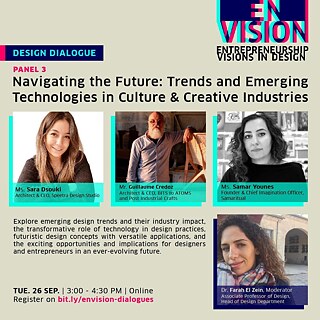
|
3) Navigating Future Trends: Emerging Technologies in Culture & Creative Industries Online | 26/09/2023 Panelists: Sara Dsouki | Architect and CEO of Speetra Design Studio Guillaume Credoz | Architect and CEO, Bits to Atoms and Post Industrial Crafts Samar Younes | Founder and Chief Imagination Officer Samaritual Moderated by: Farah El Zein | Associate Professor of Design: Head of Design Department, AUCY |
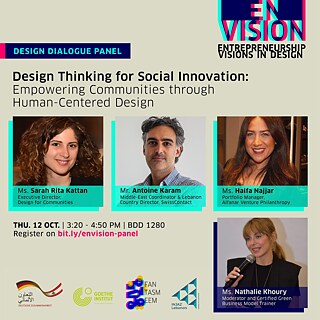
|
4) Design Thinking for Social Innovation: Empowering Communities through Human-Centered Design Offline at BDD | 12/10/2023 Panelists: Antoine Karam| Lebanon Country Director & Middle East Coordinator at SwissContact Sarah Rita Kattan | Executive Director of Design for Communities Haifa Najjar | Alfanar Lebanon Portfolio Manager Moderated by: Nathalie Khoury | Certified Green Business Model Trainer & Coach |
Talking about Design in Jordan, Iraq, and Lebanon
“A Panel Discussion during Munich Creative Business Week (mcbw) 2023”
As part of the Munich Creative Business Week (mcbw) 2023, a panel discussion with a designer from each of Jordan, Lebanon and Iraq took place in Munich on May 9. The discussion focused on the current trends, local challenges and potentials of the design scenes in these three countries.
Three designers associated with the projects FANTASMEEM, Khan el Fan or takween took part in this panel.
About the designers:
Michele Braidy (Lebanon) is an architect and multidisciplinary designer living in Beirut, Lebanon. She combines craft with innovative production techniques and the establishment of a new ecological and social design ethic. Her work ranges from interiors to installations, furniture and products.
In her lecture, Michele Braidy focused on the challenges faced by designers* in Lebanon with regard to materials. The current crises in Lebanon, which also have a negative impact on the import of materials, led her to look for solutions on how to find and work with sustainable, local materials for her design products.
Instagram: @michelebraidy.
Khadijah Abdul Nabi (Iraq) is a graphic designer and a multidisciplinary creative and brand strategist based in Erbil. She is the creative director of Ya Khadijah, a women-led design studio founded in 2017.
Born in the Bronx, New York, to immigrants from Tunis and Baghdad, she has a deep passion for exploring identity and culture through a creative perspective.
Her talk focused on issues related to identity in design approaches. She also addressed the perception of different cultures in the Middle Eastern region in Western societies and pointed out the influence of stereotypes.
Instagram: @yakhadijah.
Liyan Al Jabi (Jordan) is a designer, researcher and curator with a focus on creative industries spanning architecture, furniture, product design and urbanism. Liyan is dedicated to exploring the transformative potential of multidisciplinary design as a tool for social change. Her approach focuses on research-based interventions, context-appropriate curation, and mentoring emerging designers and designers. In recent years, Liyan has developed innovative programs to promote local creative industries, with a particular focus on social sustainability, alternative design education, and women's empowerment.
Liyan's presentation highlighted the role of design in supporting disadvantaged groups in Jordan, such as people living in refugee camps.
Website: www.arini.org. Instagram: @liyanjabi.
Innovative Design Entrepreneurship in times of Crises
“Innovative Design Entrepreneurship in Times of Crises” on April 8, 2021 – Online
In these times of overlapping and multi-layered crises, most economic agents in the world are struggling to keep afloat and find ways to navigate the current and future uncertainty as well as to overcome obstacles. As stakeholders and actors in the cultural and creative sector, designers are also economic agents confronted to dire economic conditions, especially as entrepreneurs or freelancers. Considering the realities and specificities of the MENA region, the panel discussion “Innovative Design Entrepreneurship in Times of Crises,” aimed at opening a discussion around possible ways to circumvent the challenges and obstacles faced and thrive despite a hindering context. Innovation is at the heart of the success stories that were presented during the panel discussion, as the process of thinking outside the box, of looking for new and alternative solutions proved necessary to maintain an economic activity under the current circumstances.
By presenting the projects they are working on, sharing their experience, best practices and tips, the panellists touched upon the following topics in a practical and concrete approach:
- What were the most obstructive challenges in their design entrepreneurship practice?
- How are they adjusting their projects to the ongoing crises? On which levels did they need to be innovative, pragmatic, to make concessions, or on the contrary, to stick to their initial goals and principles?
- What were the key factors of success to overcome the challenges posed by the overlapping crises that we are going through?
Reviving Design and Rebuilding a City
“Reviving Design & Rebuilding a City” on November 26, 2020 – Online
The roundtable “Reviving Design & Rebuilding a City” intended to discuss the situation and conditions for creative, professionals and other stakeholders in the design industry in Lebanon, as well as to analyse possible future scenarios and solutions for them, revolving around the reconstruction of Beirut after the port explosions. Weighing up ideas such as sustainability, individualism, and future scenarios in a post financial crisis era, a social revolution, a pandemic, and a catastrophic explosion that affected the cultural and vibrant district of Beirut, the panellists participated and contributed to the discussion by bringing in local perspectives, as well as their experience in coordination efforts and with international programs.
Questions that were tackled during the discussion revolved around the issue of the essential recognition and need for better involvement of non-state actors such as creative organizations, cultural hubs, academia, research institutions and the private sectors as major partners and adequate sponsors to the design industry in Lebanon. To what extent does designing creative spaces and futures demand a wider solidarity by and for cultural and creative stakeholders? The roundtable also served to understand the obstacles and challenges faced: What is constraining the ability of stakeholders with different roles and priorities to partner and move forward in a limited yet shared space? Which potentials can we identify and how to implement appropriate pathways towards sustainable design for the creative space in Lebanon to thrive in an inclusive manner?
Design in Times of Crisis
“Design in Times of Crisis” on February 5, 2019 – Antwork, Beirut
The panel discussion “Design in Times of Crisis” hosted several experts in the fields of design and innovation to discuss the options start-ups and entrepreneurs have in a crisis-based economy. Based on a recent report encouraging investment in creative industries within the knowledge economy while barely acknowledging Lebanon’s booming design sector, the starting point of this discussion was actually the following question: is local design thriving under unusual economic, social and environmental circumstances and how?
During the event, the role of designers as agents of change was emphasized, as they are at the crossroads between creativity and technology, where you can transform crises. Questions like their recognition as freelancers with social rights were tackled during the discussion, as well as lack of access to funding and mentoring programs, which negatively impact the social and economic status of designers. This, in turn, raised the key issue of having to prove designers’ usefulness to society, when many don’t understand that design extends beyond the realms of traditional handicraft. Indeed, in FANTASMEEM’s understanding of design, it can intersect with many other disciplines and socio-economic sectors, and should serve the purpose of doing things better in all these sectors.
